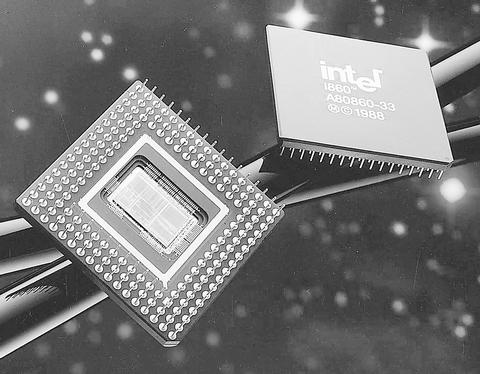NASA needs parts no one makes anymore.
So to keep the shuttles flying, the space agency has begun trolling the Internet -- including Yahoo and eBay -- to find replacement parts for electronic gear that would strike a home computer user as primitive.
Officials say the agency recently bought a load of outdated medical equipment so it could scavenge Intel 8086 chips a variant of which powered IBM's first personal computer, in 1981.

PHOTO: NY TIMES
When the first shuttle roared into space that year, the 8086 played a critical role, at the heart of diagnostic equipment that made sure the shuttle's twin booster rockets were safe for blastoff.
Today, more than two decades later, booster testing still uses 8086 chips, which are increasingly scarce. NASA eventually plans to create a US$20 million automated checking system, with all new hardware and software. In the meantime, it is finding and hoarding 8086s so that a failed one does not ground the nation's fleet of aging spaceships.
The same is true of other obsolescent parts, dozens of them.
"It's like a scavenger hunt," said Jeff Carr, a spokesman for the US Alliance, the Houston company that runs the shuttle fleet. "It takes some degree of heroics."
Troves of old parts that NASA uncovers and buys, officials said, are used not in the shuttles themselves but in flotillas of servicing and support gear. Such equipment is found, and often repaired, at major shuttle contractors around the nation, as well as at the Kennedy Space Center in Florida, where the shuttles blast into orbit.
That old computer in your basement? NASA is not interested. The agency and its contractors do not buy equipment from individuals but instead use Web searches as a way of finding stockpiles of old parts. They then buy them in bulk for repairing old machinery and building inventories of spare parts.
Recent acquisitions include outdated computer chips, circuit boards and 8-inch floppy-disk drives. "One missing piece of hardware can ruin our day," said Mike Renfroe, director of shuttle logistics planning for the United Space Alliance at the Kennedy Space Center. Recently, Renfroe said, his team swept the Internet to find an obsolete circuit board used in testing the shuttle's master timing unit, which keeps the spaceships' computers in sync. None could be found. A promising lead turned false. Finally, a board was found. It cost US$500.
"That's very inexpensive," Renfroe said. "To hire a design engineer for even one week would cost more than that."

CHAOS: Iranians took to the streets playing celebratory music after reports of Khamenei’s death on Saturday, while mourners also gathered in Tehran yesterday Iranian Supreme Leader Ayatollah Ali Khamenei was killed in a major attack on Iran launched by Israel and the US, throwing the future of the Islamic republic into doubt and raising the risk of regional instability. Iranian state television and the state-run IRNA news agency announced the 86-year-old’s death early yesterday. US President Donald Trump said it gave Iranians their “greatest chance” to “take back” their country. The announcements came after a joint US and Israeli aerial bombardment that targeted Iranian military and governmental sites. Trump said the “heavy and pinpoint bombing” would continue through the week or as long

TRUST: The KMT said it respected the US’ timing and considerations, and hoped it would continue to honor its commitments to helping Taiwan bolster its defenses and deterrence US President Donald Trump is delaying a multibillion-dollar arms sale to Taiwan to ensure his visit to Beijing is successful, a New York Times report said. The weapons sales package has stalled in the US Department of State, the report said, citing US officials it did not identify. The White House has told agencies not to push forward ahead of Trump’s meeting with Chinese President Xi Jinping (習近平), it said. The two last month held a phone call to discuss trade and geopolitical flashpoints ahead of the summit. Xi raised the Taiwan issue and urged the US to handle arms sales to

State-run CPC Corp, Taiwan (CPC, 台灣中油) yesterday said that it had confirmed on Saturday night with its liquefied natural gas (LNG) and crude oil suppliers that shipments are proceeding as scheduled and that domestic supplies remain unaffected. The CPC yesterday announced the gasoline and diesel prices will rise by NT$0.2 and NT$0.4 per liter, respectively, starting Monday, citing Middle East tensions and blizzards in the eastern United States. CPC also iterated it has been reducing the proportion of crude oil imports from the Middle East and diversifying its supply sources in the past few years in response to geopolitical risks, expanding

Pro-democracy media tycoon Jimmy Lai’s (黎智英) fraud conviction and prison sentence were yesterday overturned by a Hong Kong court, in a surprise legal decision that comes soon after Lai was jailed for 20 years on a separate national security charge. Judges Jeremy Poon (潘兆初), Anthea Pang (彭寶琴) and Derek Pang (彭偉昌) said in the judgement that they allowed the appeal from Lai, and another defendant in the case, to proceed, as a lower court judge had “erred.” “The Court of Appeal gave them leave to appeal against their conviction, allowed their appeals, quashed the convictions and set aside the sentences,” the judges